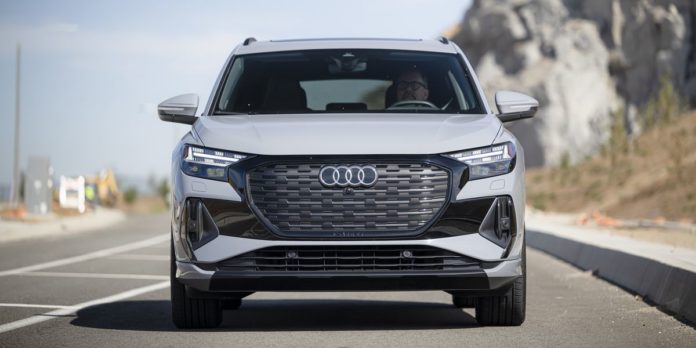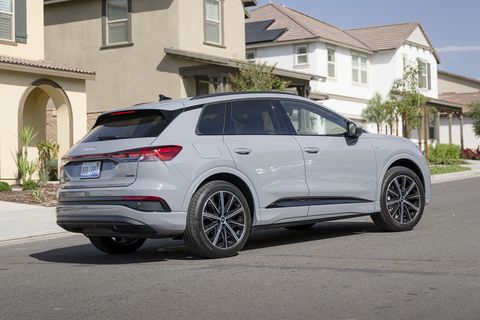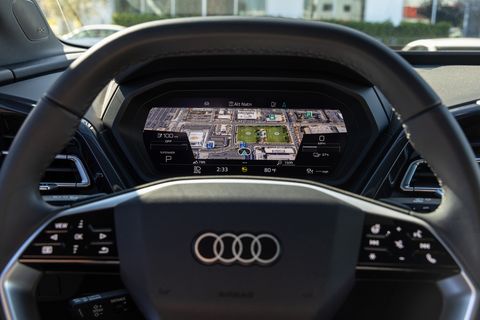From the January 2023 issue of Car and Driver.
When Audi’s e-tron electrified subbrand first appeared, it was on the unremarkable A3 Sportback plug-in hybrid. The first EV to bear the moniker came three years later, when a larger, far more expensive SUV called the Audi e-tron hit the market. That ute’s lack of an alphanumeric model name was confusing, and things didn’t become any clearer with the arrival of the e-tron GT performance sedan. Now comes the Q4 e-tron, and its designation at least helps place it within the greater Audi lineup.
Larger than a Q3 and tidier in size than a Q5, the Q4 50 e-tron Quattro is a platform-mate of the Volkswagen ID.4. Audi’s design language works well when draped over the shared 108.7-inch wheelbase and 62.3-inch front and 61.5-inch rear track widths, resulting in chunky bulldog styling that looks fetching in SUV form. The result isn’t nearly as handsome on the $2800-pricier Sportback model, but that’s often how it goes with slope-backed SUV derivatives.
As in the all-wheel-drive ID.4, a pair of AC motors that team up to produce 295 horsepower and 339 pound-feet of torque propel the Audi. Likewise, the same 77.0-kWh lithium-ion battery feeds both SUVs, giving the slightly heavier Q4 Quattro 241 miles of EPA range versus the ID.4’s 251 miles. The Q4 line’s marquee range of 265 miles comes from the 201-hp single-motor rear-wheel-drive version.
Underway, the Q4 e-tron is no canyon carver, but it feels utterly composed and balanced because of its low center of gravity and near-equal front-to-rear weight distribution. It confidently cruises straight highways with segment-appropriate steering effort, though on-center feel is more authentic with lane centering switched off. The Q4’s 60-mph time of 5.6 seconds feels sprightly in suburbia even if it trails the results from some dual-motor competitors. The 0.2 second it gives away to the Volkswagen stems from the extra 80 pounds our top-drawer Prestige trim was packing.
Inside, the Q4 Prestige feels far more upscale than the most expensive ID.4, as it should, considering the Audi’s $7990 price premium. The Q4 does retain some questionable touch-sensitive tomfoolery, but at least it avoids the grossest mistakes of the ID.4. The Audi’s climate controls are standalone physical toggles instead of capacitive-touch panels, and the driver’s window controls consist of four distinct switches instead of the Volkswagen’s irksome single pair that operate both the front and rear windows. Best of all might be the available head-up display, which uses hovering augmented-reality animations to underline vehicles within adaptive-cruise range and point you to the next navigation turn.
Bottom line: If you like the idea of the Volkswagen ID.4 but are willing to pay for a more upscale and sumptuous experience, the Audi Q4 e-tron is just the ticket.
Specifications
Specifications
2022 Audi Q4 e-tron Quattro Prestige
Vehicle Type: front- and mid-motor, all-wheel-drive, 5-passenger, 4-door wagon
PRICE
Base/As Tested: $51,095/$60,895
Options: Prestige package (adaptive cruise control with lane guidance, head-up display with augmented reality, dual-pane acoustic front side glass, Sonos premium sound, matrix LED headlights, headlight and taillight animation, heated steering wheel with regen paddles, Virtual Cockpit Plus, MMI Navigation Plus, memory for driver’s seat and exterior mirrors, hands-free power tailgate, wireless phone-charging pad), $7600; S-Line Plus package (20-inch 10-spoke aero wheels, S Line exterior, black exterior trim and roof rails, brushed dark-aluminum inlay, front sport seats, top- and bottom-flattened steering wheel), $2200
POWERTRAIN
Front Motor: induction asynchronous AC, 107 hp, 119 lb-ft
Rear Motor: permanent-magnet synchronous AC, 201 hp, 229 lb-ft
Combined Power: 295 hp
Combined Torque: 339 lb-ft
Battery Pack: liquid-cooled lithium-ion, 77.0 kWh
Onboard Charger: 11.5 kW
Peak DC Fast-Charge Rate: 125 kW
Transmissions, F/R: direct-drive
CHASSIS
Suspension, F/R: struts/multilink
Brakes, F/R: 14.1-in vented disc/11.0-in drum
Tires: Bridgestone Alenza Sport A/S
F: 235/50R-20 104T Extra Load M+S AO
R: 255/45R-20 105T Extra Load M+S AO
DIMENSIONS
Wheelbase: 108.7 in
Length: 180.7 in
Width: 73.4 in
Height: 64.7 in
Passenger Volume: 97 ft3
Cargo Volume, Rear Seats Up/Down: 25/53 ft3
Curb Weight: 4964 lb
C/D TEST RESULTS
60 mph: 5.6 sec
1/4-Mile: 14.2 sec @ 98 mph
100 mph: 14.9 sec
Results above omit 1-ft rollout of 0.3 sec.
Rolling Start, 5–60 mph: 5.7 sec
Top Gear, 30–50 mph: 2.4 sec
Top Gear, 50–70 mph: 3.3 sec
Top Speed (gov ltd): 113 mph
Braking, 70–0 mph: 177 ft
Roadholding, 300-ft Skidpad: 0.84 g
C/D FUEL ECONOMY AND CHARGING
Observed: 93 MPGe
75-mph Highway Range: 190 mi
Average DC Fast-Charge Rate, 10–90%: 87 kW
DC Fast-Charge Time, 10–90%: 44 min
EPA FUEL ECONOMY
Combined/City/Highway: 95/100/89 MPGe
Range: 241 mi
C/D TESTING EXPLAINED
This content is imported from OpenWeb. You may be able to find the same content in another format, or you may be able to find more information, at their web site.



